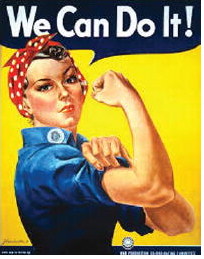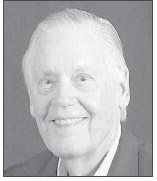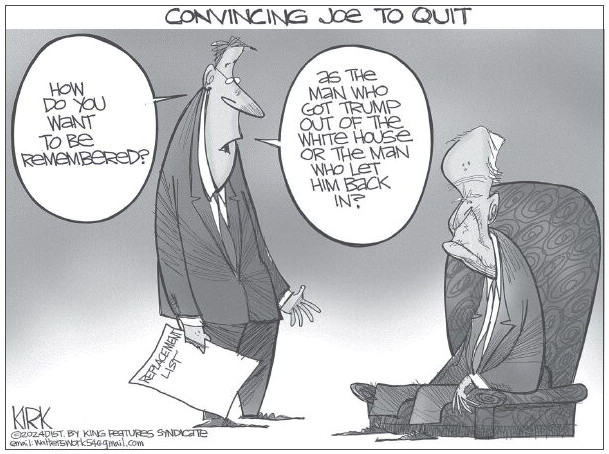editorials


A Rosie The Riveter
She talked to me so matter-offactly, as if it was no big deal. “Yes, I worked in the defense industry from 1943 until World War II ended,” Jane Tucker said to me last week. That’s when I realized I was talking to one of the few living “Rosie the Riveters.” You probably remember the image on the poster of a woman with her hair pulled back in a red polka dot bandana flexing her bicep with the words, “We can do it,” printed across the top. The poster helped recruit female workers for defense industry jobs during World War II, when American women were called upon to enter the workforce to fill gaps left by men fighting in the war. “Rosie the Riveter” became a symbol of female patriotism.
Her name is Jane Tucker, and she lives about twenty minutes from my home. She’ll be 94 years old in a few weeks and is as sharp as a tack.
“I grew up in Lineville, Alabama, and the Great Depression hit my family hard,” she told me. “It was just my mother, my older sister, and me, and all three of us worked hard just to survive. I worked at a five and dime store and made a dollar a day or 60 cents for a half day’s work on school days.”
In 1943, just after Jane turned 16, she, her mother, and sister decided to move to Savannah and work at the shipyard, both because they needed money and it seemed like “the right thing to do.”
“The three of us took the train. It was wall-to-wall GIs in their khaki uniforms, and we sat on our suitcases because there were no seats available,” she said. “I had never seen anything like it,” she said referring to the shipyard. “There were 6,000 people working on every shift. Three-story cranes and supports framed the ships. I started at $1.20 per hour for the first six weeks as a trainee, and that’s when I learned to weld. The wall panels of the ships were positioned with the cranes, and we welded the panels together.”
Southeastern Shipbuilding Corporation in Savannah churned out 88 Liberty Ships for the war effort between 1942 and 1945. “It was hard work — and sometimes dangerous,” Tucker remembered. “You had to climb up high and weld, and you had to be so careful not to get burned or have a hand or finger pinched between metal plates. My sister actually saw workers lose their footing and fall three stories to their death. I never saw anyone die there.”
The summer months were unbearably hot and humid, especially for the welders in full coveralls working in the Savannah sun.
“We wore pants during a time when women didn’t dress like that,” she told me. “We were often shunned by the people of Savannah. They didn’t think we were good women. They thought we were trying to be like men.” “It was the first time in my life that I met Yankees,” she said. “Growing up in Alabama, we just didn’t meet a lot of folks from the northern states, and I had been told that Yankees were bad people. In Savannah, at night, me and the other women would go to the USO dance hall and dance with each other and the GIs on shore leave. I met some really wonderful Yankees there, and I realized that I had been wrong to judge them that way.”
Jane and the other women who worked at the shipyard knew how important the mission was.
“We lived together, we took care of one another, we took care of each other’s children, we worried about the men who were serving in the war …” she said. “We all made sacrifices.”
Tucker welded ships until the end of the war. Up until the pandemic struck, she visited schools and events and shared her memories with others. She was happy to talk with me last week and answer all my questions.
Last month, President Trump signed a bill collectively awarding a Congressional Gold Medal of Honor to the 16 million women who worked to build vehicles, weaponry and ammunition during the war — a much-deserved honor for our nation’s “Rosies.”
Today, most “Rosies” are well in their nineties. They are as rare as our elderly WWII veterans, and like their male counterparts, they wave off special accolades and the word, “hero.” But make no mistake about it — these women are beloved members of our nation’s Greatest Generation. They are heroes, too.









